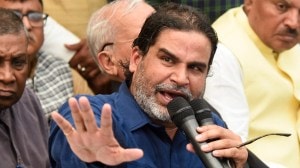With a few pieces of gold
Chandra Shekhar took a high risk way of avoiding a debt default. For today’s buoyant growth, thank him

There have been many obituaries written about our late Prime Minister Chandra Shekhar. Most have focused on his reputation as a Young Turk and the short tenure he had as prime minister. My own view is that there was one over-riding accomplishment by him and his team in that admittedly short period for which we should be eternally grateful.
The country was neck-deep in debt; our foreign exchange reserves were at a dangerously low level. We were all set to traverse the path of the profligate economies of Latin America. Suddenly, out of the blue comes forward this leadership team — clear-sighted Chandra Shekhar, sober Yashwant Sinha (his finance minister), brilliant Venkitaramanan (the newly appointed RBI governor), erudite Rangarajan (the economist deputy governor) — and they articulate something that is really rare in international finance. They assert with steely determination that under no circumstances will India default on its obligations. And to prove their point they are willing to undertake an ultimate gesture that very, very few sovereign nations have been willing to take. They physically move some of the country’s gold abroad, pledge it and raise money. What an astonishing signal that was to the external world. The Claudillos of Latin America were always looking to reschedule, to renegotiate and, more recently, to abrogate their obligations. Here was a country far poorer in per capita terms and with a stronger case, but it was choosing to not even consider for a moment such a course of action.
To honour one’s debts is something enjoined on us by our ancients as a dharma. We even have a saying that if we welsh in this life, we will get caught with having to pay it back in the next. The Sanskrit word ‘runa’ refers to something that sticks to you. In honouring the debts incurred by previous administrations, Chandra Shekhar’s team was being faithful to their rajdharma. As we all know, good ethical behaviour is usually tied up in the long run with good material outcomes. (Where dharma reigns can artha be far behind?) And that is precisely what happened. The country which went to the brink came back with a bang and is today not just solvent, but it is so in a manner that is so healthy it almost smacks of plenitude.
In a democracy like ours, where everyone is willing to throw stones and few are willing to praise, it must have taken enormous courage, dedication and fortitude to take the ultimate action of pledging the country’s gold. If things went wrong, the country would never have forgiven them and many, not just the denizens of the Fourth Estate, would pounce on them in a hyena-like fashion. And yet the principal actors did it because they thought that it was the right thing to do. Knowingly, they took the risk that their careers (which had been very successful until then) could get wrecked if events moved against them. It was also probably clear to them that if the country did come out of its problems they would not get much credit for it as events have subsequently proved. If this was not ‘nishkaama karma’, please show me another. I have personally spoken to one of the actors involved in the physical transportation of the gold. To listen to him describe their tension (what if it got stolen or hijacked, what if the plane crashed?) is hair-raising in itself. After all we are not talking about transporting scrap iron, but the precious savings of
billions of Indians.
And consider what would have happened if India had reneged or rescheduled in a major way. We would have gotten classified as a roller-coaster country with irresponsible ‘ricos’ and impoverished ‘descamisados’, and like all the countries which have taken the easy way out condemned ourselves possibly to a decade of negative growth followed by a decade of low growth taking us down the vicious spiral of greater and greater poverty. Do not forget that not that long ago Argentina was considered a potential United States, but the selfish, short-sighted privileged rulers of that country, by taking the dishonourable easy way out, have not only sullied their country’s reputation but created a situation where a richly endowed country has been made a poor one stuck in a blind alley.
The greatness of a leader is not measured merely by the number of years that he or she is in power. If the quality of the leader’s team is any reflection of the leader’s own abilities, one must grant that Chandra Shekhar put together a truly able team. Their achievement was a collective one. This does not take away from the leader’s eminence; it quite possibly adds to it. Some achievements go un-noticed because in retrospect they seem obvious. It would be interesting to see how an econometric model would project India’s trajectory if in fact this team had not intervened decisively. That would give us a measure of their endeavour.
Luckily for us, Chandra Shekhar was followed by Narasimha Rao, a truly great leader who did not in fashionable mode discard his predecessor’s foundation, but built on it. The result is that we have a growing economy, burgeoning tax revenues and foreign exchange reserves which, if anything, are a tad excessive. We have still not addressed with sufficient emphasis the persistent problem of how to make each Indian citizen get access to prosperity. But at least we have a chance now. With 3 per cent growth and rock-bottom reserves we could have forgotten poverty elimination for another century. If we don’t get it right, it is not because there is problem with the legacy of Chandra Shekhar and Rao, we will have only ourselves to blame. A fitting tribute to Chandra Shekhar who was clearly concerned both about India and Bharat and who saw no pre-destined conflict between the two would be to throw the dice to take our growth rate up to 12 per cent and at the same time deal head-on with the poverty of two hundred million of our fellow-citizens
that still disfigures this otherwise fair land.
The writer is chairman, Mphasis



- 01
- 02
- 03
- 04
- 05




























